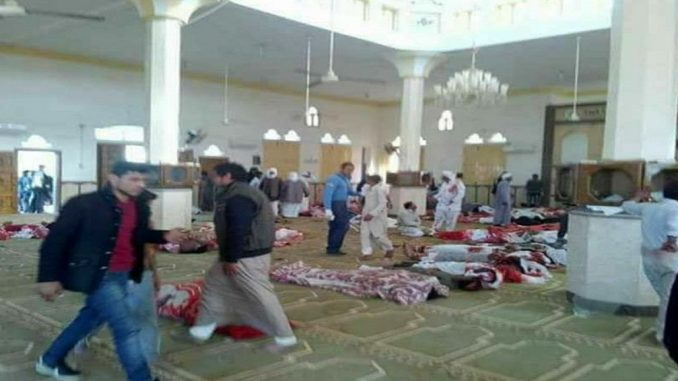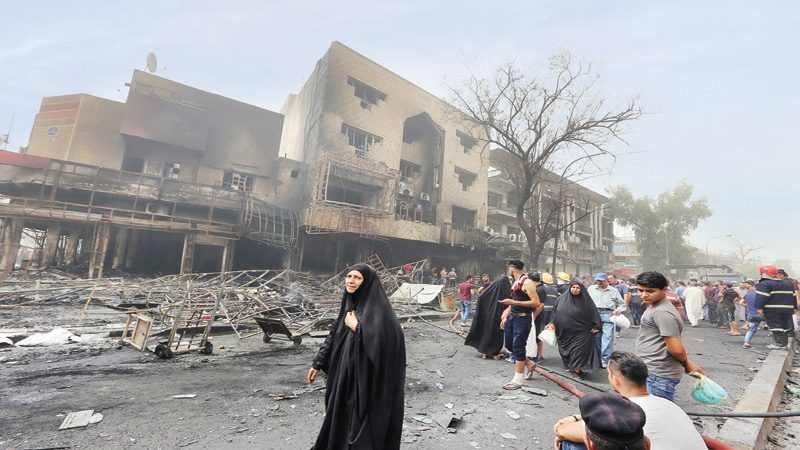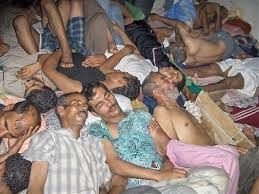
At least 300 people have died in a militant attack on a mosque in Egypt’s restive Sinai peninsula in one of the worst terrorist incidents the country has seen in recent years.
On Friday, Egypt was rocked at noon by a coordinated assault by gunmen on a mosque in the Sinai Peninsula.
Gunmen opened fire on worshippers during Friday noon prayers – the most important period of observance for Muslims, where mosques are usually crowded – killing 235 people and injuring 109 others. During the noon sermon, four off-road vehicles carrying armed men arrived at the al-Rawdah mosque in Bir al-Abed, a small village 40km west of North Sinai’s main city Al-Arish.
According to survivors, militants opened fire from the vehicles and gunned down any people who tried to flee the building. Three police officers on the scene said that also blocked off escape routes from the area by blowing up cars and leaving the burning wrecks blocking the roads.
The Egyptian authorities declared an immediate counterattack. “Egypt’s air force is following the trail of the terrorists and has destroyed two or three of their vehicles,” reported a military source. He could not give more details about the attack itself, as it was not directed at the military.
It is worth to mention that the attacked mosque is known as a place where Sufis, followers of a mystical strand in Islam, come to pray. Radical Islamist militants consider Sufism to be a form of sorcery, forbidden in Islam.
Egypt’s Al-Sisi announced a three-day mourning in response to the attack. “Terrorists want to demoralize us and spread doubt about our capacities, but this attack only unites us and makes us more persistent,” he said in a live address on national television. He added,”The army and the police will take revenge for the people and will recover security in the area soon.”
Other countries offered their condolences to Egypt, with British Prime Minister Theresa May calling it an “evil and cowardly act” and the French foreign minister, Jean-Yves Le Drian, condemning the attack and saying Paris stood with its ally.
US President Donald Trump denounced what he called a “horrible and cowardly terrorist attack on innocent and defenceless worshippers in Egypt.”
Is it isis?
No group claimed responsibility for the deadliest attack, but since the military coup in 2013 North Sinai has been the site of an ongoing insurgency by jihadists.
ISIS’ Sinai affiliate – known as the Sinai Province group – first emerged in 2011, and was previously known as Ansar Beit al-Maqdis. It pledged allegiance to ISIS after the declaration of their so-called caliphate across Syria and Iraq in 2014.
Since then, the militant group was responsible for near-weekly attacks on the army and police in Sinai. It has also claimed responsibility for dozens of attacks, including the 2015 bomb abroad a Metro Jet flight which killed 224 people, many of them Russian tourists.
“Almost every sign points toward Isis in Sinai” being behind Friday’s mosque attack, said Mohannad Sabry, a Sinai expert and author of Sinai: Egypt’s Linchpin, Gaza’s Lifeline, Israel’s Nightmare. He added,”They have had a decades-old lethal animosity with the Sufi community in Sinai and have killed several of their most revered clerics over the past years.”
In December 2016, the ISIS branch in Sinai, which calls itself “Sinai State”, claimed responsibility for the beheading of two Sufi sheikhs accusing them of apostasy and sorcery, and threatened that it would not allow the presence of Sufi orders in Sinai or Egypt.
The group has also frequently destroyed Sufi shrines in North Sinai.
A Sinai resident said that generally there has been a change in how locals perceive Sufis in recent years. “It’s not really sectarianism but more like ‘us versus the other’, which was not common among Bedouins.”
The military source also believed ISIS was behind the attack. “They attack everyone, Christians, Muslims, the military,” he said. He suggested the attack could indicate a change of tactics, as this is the first such large-scale assault directly targeting civilians in the region. “They did kill civilians, but not at this scale,” he said.
“It is certainly a unique and unprecedented attack,” Mr Sabry said, adding that it sends”“a loud message to the North Sinai community that even a Muslim house of worship, as long as it doesn’t pledge allegiance to Isis, is a target.”
Mr Sabry sees another reason for Isis to attack Sufis. “The Sufi community in North Sinai has definitely succeeded in what billions of dollars and hundreds of lives spent by Egypt’s military could not achieve,” he said. “It powerfully kept thousands of youths away from joining the ranks of ISIS and has continued to fight them on social, intellectual and most importantly religious levels.”
Is the Attack a Result of Al-Sisi’s Dangerous Strategy of Using Local Tribes in the War on Terrorism?
Right after the deadliest attack, the member of parliament representing al-Arish, Hossam El-Refaay said that most of those who were dead in the attack are from the Sawarka tribe which has previously announced its support to the police and the military.
He also added that the attack came as revenge from the tribe for its support to Egyptian military and police in countering terrorism.
In May 2017, a media report was released warned Al-Sisi from using local tribes in the war against terrorism as it will widen the scope of fighting in Sinai.
Well informed sources said that a report prepared by the Egypt’s General Intelligence Directorate has warned Abdel Fattah Al-Sisi against the dangers of widening the scope of confrontation in the Sinai area between local tribes on the one hand and the Sinai Province group, which is affiliated to Daesh, on the other, according to al-Araby al-Jadeed.
Al-Araby Al-Jadeed pointed out that the sources are of “a military-academic nature”.
The report warns against the idea of forming armed squads of civilians from among Sinai’s local tribes to fight the Sinai Province militant group under the Egyptian military’s supervision.
In addition, the report also noted that the idea had been previously brought up several times in the country’s security circles, but was always met with rejection.
According to the intelligence report that was recently presented to al-Sisi, the decision to allow local tribes to fight against the Sinai Province could lead to catastrophic repercussions and opens the door for a civil war in the Sinai, Al-Araby Al-Jadeed said.
In the same context, the Independent, British daily newspaper, released a separate report in May 2017 warning from arming local tribes in Sinai. It said that Al-Sisi is employing local militia to offer assistance to the Egyptian security forces in their war against ISIS, which shows how desperate al-Sisi’s war against ISIS has become.
Moreover, it pointed that this, in fact, is one of the most alerting factors in Egypt’s war against terrorism as the Egyptian army is following the same contaminated path as many of its neighbours by using a killer-militia in its war against ISIS in Sinai, especially that counter-insurgency wars always breed corruption and counter-murder.
In the end, the Independent said, “The problem is that Egypt’s out-of-control war against ISIS– and ISIS’s new killer cells west of the canal – may soon make such institutions powerless. And when army militias are now at work to execute the state’s supposed enemies… Well, just think Iraq.”



